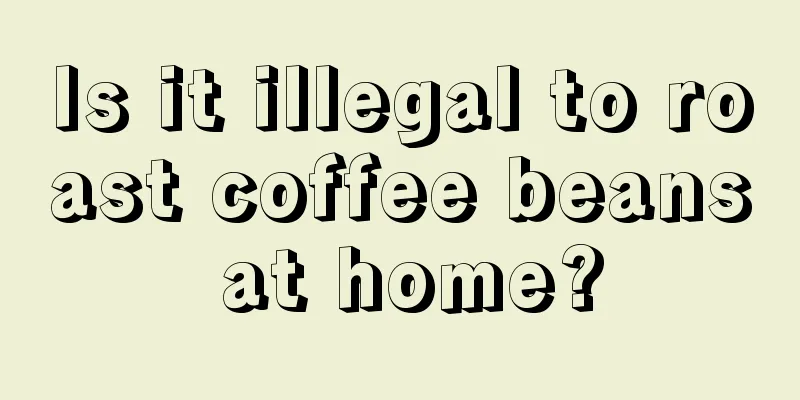Is it illegal to roast coffee beans at home?

Legality of roasting coffee beansRoasting coffee beans at home is an increasingly popular activity, with many people enjoying their morning or afternoon tea with a cup of homemade coffee. However, some people may be concerned about whether this is legal. This article will explore whether roasting coffee beans at home is illegal. Relevant legal provisionsFirst, we need to understand the relevant legal provisions. According to the food safety and hygiene standards of most countries and regions, individuals can carry out food processing activities in their own homes. This means that roasting coffee beans at home is usually legal. However, there may be special regulations or restrictions in some countries or regions. For example, some places may require individuals to obtain specific licenses to engage in food processing activities and need to follow specific hygiene standards and procedures. Food Safety and Quality ControlAlthough roasting coffee beans at home is legal in most cases and does not require a special permit, food safety and quality control remain important issues. There are some basic principles that individuals should follow when engaging in food processing activities. First, it is vital to maintain cleanliness and hygiene. Before roasting coffee beans, make sure the work area is clean and disinfected with appropriate cleaning agents. In addition, individuals should pay attention to hand hygiene and avoid mixing other items or impurities into the coffee beans. Secondly, choosing high-quality coffee beans is also very important. Buying products from reliable suppliers or organic certification can improve the quality and safety of the coffee beans themselves. Commercial Sales and ExportWhile it is generally legal to roast coffee beans at home without the need for a special license, if you plan to sell or export your roasted beans commercially, you may need to meet specific conditions and regulations. For example, in some countries or regions, engaging in food processing activities and commercial sales may require obtaining relevant licenses and complying with specific standards and procedures. In addition, when exporting to other countries, you will also need to comply with the import requirements and regulations of the destination country. in conclusionOverall, roasting coffee beans at home is generally legal. However, individuals should follow food safety and quality control principles and be aware of regulations and conditions if planning to sell or export commercially. By following these guidelines, you can roast your coffee beans at home with confidence and enjoy the pleasure of making your own coffee. |
<<: The best time to brew coffee beans: the secret to perfect taste revealed!
>>: Starbucks Coffee Beans: Are They Worth Buying?
Recommend
Drinking coffee every day: the pros and cons
Drinking coffee every day has both advantages and...
Tips for making coffee milk foam: 5 tips to share
Tips for making coffee milk foam: 5 tips to share...
How many coffee beans and how much water are used for a cup of coffee
Global influences of coffee culture and an exquis...
What is the difference between cheap coffee beans and expensive beans?
Coffee is one of the most popular beverages in th...
There are so many benefits of coffee. I really learned a lot after reading this.
I once saw this sentence on the Internet: What is ...
How to make delicious coffee with coffee beans without a coffee machine at home
How to Make Delicious Coffee at Home Enjoying a c...
Chinese local coffee beans: Taste the power of the earth
Chinese local coffee beans: Taste the power of th...
Uncovering the secrets of low-sugar coffee: sugar content and its unique charm
Abstract: As a healthy drink, low-sugar coffee ha...
Milk and coffee: the passionate relationship between intimate partners
Milk and coffee: the passionate relationship betw...
Can drinking coffee beans soaked in water help you lose weight?
Coffee Bean Composition Analysis: Health Effects ...
Various processing methods of coffee beans
Various processing methods of coffee beans Coffee...
Coffee Bean Varieties Revealed: Endless Choices!
Coffee bean varieties revealed: countless choices...
Cocoa beans vs. coffee beans: ingredients revealed
Cocoa beans vs. coffee beans: ingredients reveale...
Can coffee beans and milk be mixed together?
Coffee beans and milk: the basis of a perfect mat...
Selected Arabica coffee beans: pure quality, enjoy the coffee aroma
Selected Arabica coffee beans: pure quality, enjo...









